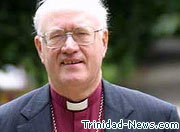People who support traditional marriage are being hit with intolerance and judgmentalism by those calling for more tolerance, the former Archbishop of Canterbury has warned.
Lord Carey’s comments came after Nick Herbert, the Policing Minister, accused Christian leaders of sounding “highly judgmental or intolerant”.
In a carefully worded letter to The Times, Lord Carey warned that it is supporters of traditional marriage who face judgmental labels.
Definition
Responding to Mr Herbert’s comments Lord Carey said: “This debate is not about the dignity and rights of gay and lesbian people, who already have the benefits of marriage through civil partnerships, but about a change in the definition of marriage for everyone.
“Does he realise the extent to which this so-called ‘consultation’, with no backing from his party’s manifesto, is leaving many people alienated and distant from his government?
“It is in fact the supporters of traditional marriage who have been accused of bigotry and homophobia — the kind of intolerant and judgmental language he talks about in his interview.”
Consultation
During an interview with The Times Mr Herbert, who is in a civil partnership, said that he had never “felt more distant from the Church than I do at the moment”.
He added: “I think that some Christian leaders have said things that, when heard by gay people, sound highly judgmental or intolerant.”
The Westminster Government’s consultation on its plans to rewrite the definition of marriage closed last week after reportedly receiving more than 100,000 responses.
Crisis
A petition, organised by the Coalition for Marriage, in support of the current definition of marriage has now been signed by almost 600,000 people.
Last week the Church of England warned that the Government’s plans to redefine marriage could trigger a constitutional crisis and end the 500-year link between church and state.
In its response to the Government’s consultation on the matter the Church described the plans as “divisive” and “essentially ideological”.
It dismissed the Government’s attempts to create a distinction between “civil” and “religious” marriages, saying “this is to mistake the wedding ceremony for the institution of marriage”.

